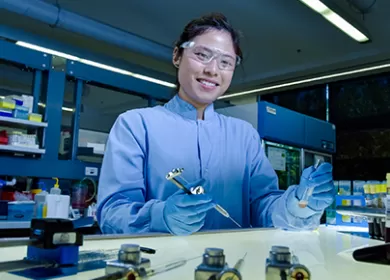Lifeblood’s Australian-first donated breast milk research will help thousands of babies
Exploring how donated breast milk may benefit babies born later than 32 weeks gestation.
Lifeblood researchers are conducting Australian-first research that could potentially help thousands of babies in the future. They’re exploring how donated breast milk may benefit babies born later than 32 weeks gestation when the mother’s own breast milk is unavailable. Contributing to our research is our newest Innovation Partner, Sudocrem, who have generously donated $100,000.
Our national milk service has already closed the gap in helping very preterm babies (born less than 32 weeks’ gestation) access donated breast milk, and we’re excited that this donation will help us progress our clinical trials to babies born after 32 weeks.
We currently supply milk to more than 1,000 babies every year across New South Wales, South Australia, Queensland, and Tasmania.
“Donated breast milk is the World Health Organisation’s recommendation for infant feeding when a mother’s own breast milk is unavailable, because of its association with improved breastfeeding rates and protective properties,” says Lifeblood researcher Dr Laura Klein.
“Our research will aim to explore other benefits for infants and their families, including reducing allergies during the first year of life. There’s little research to inform the use of donor milk in babies born after 32 weeks, and funds from Sudocrem will be vital in helping progress our clinical trials into understanding the benefits of donor milk for more babies.”
Donna is one of our most generous and dedicated milk donors. While breast feeding her own two boys she’s also so far donated an astounding 499 litres of milk. That’s the equivalent of over 830 water bottles or enough to fill almost three and a half bathtubs! Her donations have fed premature babies in neo-natal intensive care units across New South Wales, South Australia, Queensland, and Tasmania.
"It was hard work, enjoyable, there were moments of craziness — crying over spilt milk — but it is a fantastic experience," Donna said.
"It is something I could do and it makes me feel like I can help."
Milk Operations Manager Chris Sulfaro said Donna's milk "went to every neonatal intensive care unit that we supply as well as our research for babies over 32 weeks" — an outcome Donna described as "mindblowing".
"It's an amazing achievement and feat and it just goes to show what wonderful altruistic women our amazing donors are," Chris said.
"They're busy with their own little babies, they're busy feeding them and yet they still express for the purposes of donating.
"They don't know this baby, they don't know this family, but they want to be involved in making a difference and donating breastmilk makes such a huge difference."
When Lifeblood opened our first milk facility in 2018, more than three quarters of Australian early preterm babies didn’t have access to donated breast milk. Now they almost all do. We’ve collected more than 12,500 litres, and fed more than 3000 pre-term babies. Our vision at Lifeblood is to see all premature babies in Australia have access to the best possible nutrition when they’re at their most vulnerable.
For Sydney Mum Jemma, it’s a service she wishes had existed when she gave birth.
“My little one Piera arrived into the world a small 2.4 kilos. She had stopped growing due to restriction in my womb, and was induced,” Jemma said.
“She was so small we had trouble feeding, she was always asleep, and unable to suck properly. At just seven days into my journey we went to a local midwife clinic to see what was wrong. They told us to go to the hospitals straightaway, Piera was too small, had lost weight, and I had to stop breastfeeding. It was using up more energy than she had to give.”
One of Jemma’s close friends offered her own donated breast milk, promising to provide a daily delivery until Piera reached six weeks.
“I’ve never been so grateful to someone in all my life. It meant Piera would have that extra protection. It also helped me out of a dark place,” said Jemma.
“Ideally, that milk would go through the same process that all donated breast milk given to milk banks does, to ensure access for those who might need it, as well as safety for vulnerable babies. Donated breast milk is medicine for premature babies, but it’s also mental health medicine for us mothers.
“That milk was the most precious and life-saving gift I’ve ever received. I hope one day, if the research and the Australian community supports it, that it may be there for all mothers, who may be on the same journey I was.”
